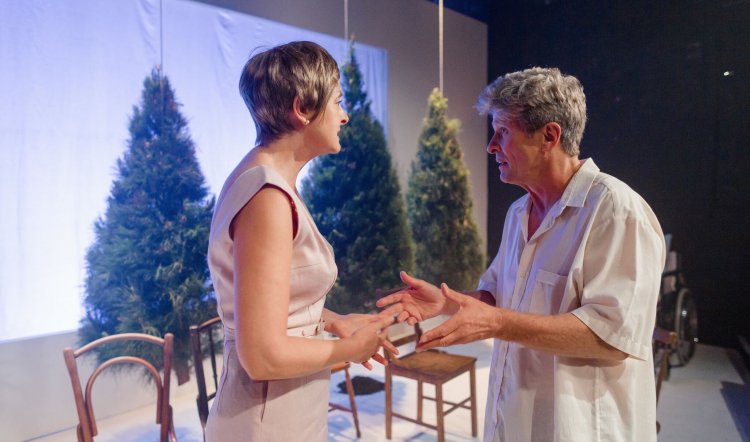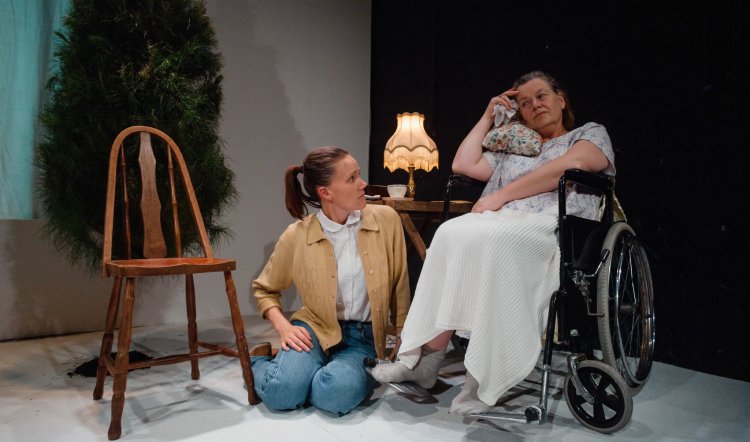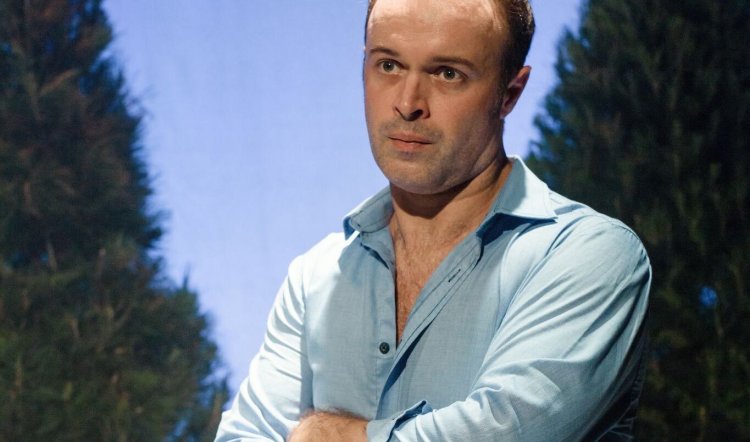
THE SHADOW BOX
THE SHADOW BOX, Red Line Productions at the Old Fitz, 15 November-10 December 2016. Photography by Robert Catto, above - Jeanette Cronin and Mark Lee; below: Ella Prince and Fiona Press; below again: Anthony Gooley
Michael Cristofer’s play opened on Broadway in 1977 and it won the year’s Pulitzer Prize for Drama and Tony Award for Best Play; not a common double and one that says a lot about its literary quality as well as the opportunities it affords actors (a cast of nine with no bit parts).
Directed by Kim Hardwick, The Shadow Box is a demanding, dramatic and intense two hours (including interval) in the company of some ordinary people and their ordinary lives and families. What makes them extraordinary and compelling company, however, is that three are approaching the sharp end of terminal cancer: there is nothing more to be done and all are dealing with that fact, or not.
The thing about The Shadow Box, though, is that it’s neither depressing nor morbid (unless you just want a fluffy night out, that is) because it draws on such rich characters and stories and, in the end, they are actually about life and human resilience. It’s also wryly comical in places and the resulting light and shade are what make the play memorable and convincing even after all these years.
Set in the peaceful garden surrounds of an unseen hospital are respite cottages where patients and their families can be together for a while. The set (Isabel Hudson) makes a virtue of the Old Fitz’s restricted stage area by emptying the white painted space but for five conifer trees suspended from above and some upright chairs, with pools of light and shadow differentiating place and passing time.
Hudson also designed – or foraged – the costumes and they signal that the original ’70s setting has not been updated in a way only splayed shirt collars and awful prints could do.
Mark Lee is Joe, a decent working class man whose wife Maggie (Jeanette Cronin) is so unable to acknowledge his looming death she cannot bring herself to enter the cottage; and has not told their guitar-toting teenage son Steve (Simon Thomson) that his dad won’t be coming home. Maggie’s brittle emotional mix of rage and dread is sadly all too credible; it’s beautifully counterpointed by Joe’s gentle acceptance of her feelings and his own fate.

In another cottage, in a wheelchair – and drifting in and out of dementia – is one time cattle rancher Felicity (Fiona Press). She is a determinedly ornery woman, her heart callused by a hard life. That it has now dealt her one final blow is something she finds – almost – funny, when she’s in the present.
Felicity is patiently tended by her younger daughter Agnes (Ella Prince). Her resolutely blank emotional carapace is protection against her mother’s constant calling for Claire, the favourite daughter who writes from Mexico but will not be visiting any time soon. That she is dead and the letters are Agnes’s way of shielding Felicity is bittersweet in the face of the obvious daily pain for the younger daughter of being second-best – at best.
In the third cottage is urbane former academic Brian (Tim McGarry). His much younger former hustler lover Mark (Anthony Gooley) is finding the going tough enough even before Brian’s ex-wife Beverley (Kate Raison) arrives. She’s a vividly “happy” good-time gal whose progress through life is marked by the loot gleaned from each man she’s ensnared along the way.
In another neat character twist, the non-drinking, non-swearing, uptight Mark is the antithesis of Beverley, whose tote bag holds champagne as well as a bottle of vodka that she accidentally opened before arriving at the cottage. Mark and Beverley are on a collision course with Brian in the middle, is the obvious.
Nothing is that obvious in Cristofer’s play, however, and this becomes clear when each of the patients has sessions with the unseen but professionally soothing disembodied voice of a therapist-interrogator (Jackson Blair-West). The creepily insistent tone is sufficiently passive-aggressive as to get them to spill the inner beans of their lives while they are trapped like rabbits in a spotlight.
In its early productions The Shadow Box’s programs, and writing about the play, referenced the influential and now world famous How-to-Deal-with-“It” 101 – aka – On Death and Dying, by psychiatrist Elisabeth Kubler-Ross (1926-2004), which was as much about life and living as anything else.

Whatever the current thinking is on death – Kubler-Ross’s were the five stages, from Denial through Acceptance to Anger, then Bargaining and finally, Depression – doesn’t really matter, although Cristofer had them all in his sights through his characters. What is crucial in The Shadow Box is the dynamic sense of being alive and the powerful human instinct to stay that way.
Under Kim Hardwick’s intelligent and light-handed guidance the actors are splendid. Mark Lee has never been better as he inhabits the tender skin of sad, sweet Joe and Jeanette Cronin is his perfect foil in her tragically nuanced, furious fragility.
Kate Raison brilliantly raises the comedy and pathos stakes as the spirited tart with a heart as Tim McGarry’s Brian is the “straight” man who moves from camp to ennui to sadness without apparent effort. As Mark, the young, less educated, less sophisticated man in Brian’s life, Anthony Gooley is a magnetic presence whose unwilling change of attitude towards Beverley is captured in a fragmentary and perfect scene where he says not a word.
Although mostly still and shadowed for much of the play, Fiona Press is a disturbingly powerful presence, so much more familiar are we now (rather than 40 years ago) with the black comedy of early dementia. As she drifts through the mists of heavy drugs and her failing mind, there are glimpses of the austere dignity that was the independent rancher.
It’s ironic then, that as Felicity defiantly continues her one way journey away from the once indomitable woman, her younger daughter Agnes is slowly and painfully going the other way. Ella Prince – a newcomer to Sydney stages – gives a subtle performance. Her face is seared by hurt and every move and word evokes the bowed but never broken kid who will survive.
The Shadow Box is another fine achievement for Red Line – and producer Dino Dimitriadis – that deserves a rush at the box office. The play and this production takes the toughest yet most spellbinding subject, treats it seriously and fudges nothing. It’s humane and often illuminating and a reminder that gallows humour is really very funny, as when Brian says, “Our dreams are beautiful, out fate is sad. But it’s generally pretty funny.” Recommended.



